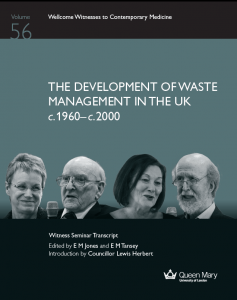16 September, 2021 | Publication, Resource and waste management
Professor David C Wilson is pleased to co-author an important new publication The Nine Development Bands: A conceptual framework and global theory of waste and development. The open access paper in ISWA’s peer-reviewed journal Waste Management & Research can be downloaded freely. The ‘9 DBs’ builds on the integrated sustainable waste management (ISWM) analytical framework to help characterise waste and resources management (WaRM) systems in cities and countries. Based on over 100 years of combined experience of the authors (Andrew Whiteman, Mike Webster and DCW), the 9DBs is a powerful addition to the waste management practitioner’s toolkit, bringing depth and nuance to understanding of WaRM systems globally.
The early DBs reflect stepwise improvement towards the new
baseline of meeting the SDG 11.6.1 indicators of universal collection and
management in controlled facilities (DB5); while later DBs represent two
prevailing routes to move towards environmentally sound management (ESM) and
the 3Rs (Reduce, Reuse, Recycle). An aspirational DB Zero, a real circular
economy, sits above all 9 DBs, accessible via multiple pathways, posing an
ultimate challenge for development practice. The 9DBs contextualise the
challenge of meeting the waste-related SDGs, in particular for developing
countries striving towards SDG 11.6.1 but also for all countries aspiring to a
circular economy. Whether you are a practitioner, decision-maker, service
provider, or sector activist, the 9DBs will help you to identify the key
pressure points for catalysing change, and focus your time and resources on
achieving maximum impact.
31 August, 2018 | Conference, Waste Management
CIWM President, and Chair of CIWM’s Hazardous Waste Special Interest Group (SIG), David C Wilson reflects in his August CIWM column on the challenges facing hazardous waste management in the UK and Ireland – past, present and future. His review with the SIG of current challenges suggests that not much has changed over the 44 years of his involvement with the hazardous waste sector. In particular, the UK continues to lack the ‘regulatory certainty’ which is necessary to secure the investment required in hazardous waste management infrastructure if such investment is left entirely to ‘the market’. And looking at the island of Ireland in particular, the uncertainties around Brexit do not help.
16 November, 2015 | Publication

The book cover
DCW took part in a Witness Seminar on The development of waste management in the UK c.1960-c.2000. The transcript has been published as Volume 56 of a series published by what is now the Wellcome History of Modern Biomedicine Research Group at Queen Mary University of London. The book is free to download, or can be purchased for £6 ($10) from any good bookshop by using the ISBN 978 1 91019 5062.
The Witness Seminar is a specialized form of oral history, where a number of individuals associated with a particular set of circumstances or events are invited to meet together to discuss, debate, and agree or disagree about their memories. The meeting is recorded, transcribed, and edited for publication.
This volume on waste management is a relatively new departure for the Wellcome series, following just one previous volume on Public Health. The scope was developments in the waste management industry and the production of waste in the UK since the 1960s, with a particular focus on London. A total of 25 people were invited to take part in the seminar in February 2014, of whom 16 were able to attend. According to the blurb: ‘The volume includes testimonies from former refuse collectors, senior municipal waste managers, policy makers and academics’. The Seminar was chaired by Dame Joan Ruddock, who as an MP initiated two important pieces of waste legislation, and the volume has an introduction by Councillor Lewis Herbert, who chaired the Greater London Council (GLC)’s Environmental Panel in the 1980s.
A series of six more detailed interviews were undertaken after the seminar, and these are also available online. The undoubted ‘star’ of both the seminar and the subsequent interviews was Ernie Sharp, who worked his way from dustman to Assistant General Manager for solid waste management for the GLC, and who obtained his MPhil at the age of 88. Ernie passed away earlier this year, and is sadly missed: the book is dedicated to him.
The introductory section on ‘What is a Witness Seminar’ concludes as follows. ‘For all our volumes, we hope that, even if the precise details of the more technical sections are not clear to the non-specialist, the sense and significance of the events will be understandable to all readers. Our aim is that the volumes inform those with a general interest in the history of modern medicine and medical science; provide historians with new insights, fresh material for study, and further themes for research; and emphasize to the participants that their own working lives are of proper and necessary concern to historians.’
